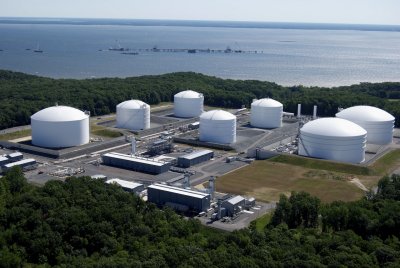
Dominion Resources's Cove Point facility has seven LNG storage tanks in Calvert County. Photo courtesy Dominion Resources.
ANNAPOLIS-The seven towering white tanks that store liquefied natural gas for Dominion Resources in Cove Point have never caused a safety issue for the energy company.
But some Calvert County residents said they are uncomfortable with the proximity of the tanks to their neighborhood, and Dominion’s plan to use the facility to export LNG to Asia.
The tanks at Cove Point are single-walled containment, which means the gas is stored in a container with an outer metal shell surrounded by a dike that can hold 110 percent of the gas inside. The seven tanks can hold a total of more than 13 billion cubic feet of LNG, according to Virginia-based Dominion.
June Sevilla moved to Cove Point Beach in 1995 from Montgomery County.
The engineering consultant said she was drawn to the area because it was quiet and tucked in a rural area on the water, but is still close enough to drive into Washington, D.C.
Sevilla, whose house is next to Dominion’s property, said she is concerned about how close the tanks are and would prefer double-walled tanks.
“Some of those tanks are old, very old,” she said.
Dominion constructed one of the single-walled tanks in 2004, two in 2008 and four were original to the facility, which was built in the 1970s to import LNG. Double-walled tanks have two containers - one inside the other - that can contain liquefied natural gas.
Dominion officials said there are enough safeguards in place with the single-walled tanks to contain a spill.
But neighbor Dale Allison, a retired aerospace engineer, said he is concerned that if there was ever a leak in a tank, the gas that enters the dike could create a potential vapor cloud that might drift to nearby homes.
Allison said he would feel more comfortable with a tank that uses double-walled containers to hold refrigerated gas.
“My home is 2,200 feet from that tank,” he said.

Map shows a radius of 1.25 miles from the LNG facility.
According to 2010 U.S. Census data, at least 832 people live within 1.25 miles of the facility, near Lusby.
Single-walled tanks themselves have never been a problem but local officials have allowed increased development to occur, leading to a decrease in the distance between the facility and the population in Calvert County, said Michelle Foss, chief energy economist at the Bureau of Economic Geology’s Center for Energy Economics, based at the University of Texas-Austin.
Jim Norvelle, Dominion’s spokesman, said that regardless of the population proximity, the gas is stored at 260 degrees below zero. A leak the gas would begin vaporizing immediately and the dikes that surround the tanks would be enough to contain gas, he said.
Norvelle said there are systems in place that would stop pumps and valves during a leak.
He added that the gas dissipates as it returns to normal temperatures making the dike all that’s necessary.
“Single tanks are perfectly safe or the government would not let us operate and we would not want to operate them if they were not safe,” Norvelle said.
According to a 2009 Congressional Research Service report on LNG import terminals, if gas did spill without immediately igniting, there is a possibility of a vapor cloud that could drift and if it encountered an ignition source, the combustible part of the air would burn.
The report states that there would only be a small part of that cloud which is combustible, but it could still cause significant damage.
James Fay, a mechanical engineering professor emeritus at the Massachusetts Institute of Technology, said changes to the plant to make it ready for exporting gas could increase the potential risk of fires.
He said the Federal Energy Regulatory Commission should give the facility a full environmental impact statement. The commission is working on an environmental assessment but an environmental impact statement would look at a wider range of issues.
Despite questions, a large majority of the more than 110 LNG facilities in the U.S. use single-walled tanks and there has never been a tank failure, Foss said.
“Not much can threaten that kind of infrastructure,” she said.
Many of those single-walled tanks, however, such as those used at a facility in southeast Texas near the Gulf of Mexico, are much farther from residential areas than the one at Cove Point, Fay said.
He said many single-walled tanks, including four of the seven at Cove Point, were built during the 1970s and that more energy companies around the world are using full containment tanks, which are even stronger than double-walled tanks because they have an outer concrete wall.
In a 2006 tank technology study by CLP Power for an LNG terminal in Hong Kong, the report notes that full containment tanks are prominent around the world and the single tanks are used mostly in remote locations.
Foss said many of the countries that use full containment tanks are in earthquake-prone areas and have large populations that are directly next to those tanks.
While single-walled containment tanks are frequently used in American facilities, they are not used for storing LNG on shipping vessels.
LNG tankers used a double-hulled system where there are two bottom layers and two side layers of hull surface because of risks at sea, such as grounding and collisions.
“A tanker is a whole different ballgame,” Foss said.
Foss said many people have a misunderstanding of single-walled tanks and worry needlessly because the tanks are so large and visually prominent.
She said the use of suitable metals is more important than whether the tank uses full, double-walled or single-walled containment.
Sevilla said that regardless of the fact that there’s not been an accident since she’s lived in Calvert County, she is concerned that the terminal’s transformation to an export facility increases the risk.
“Now you’re adding a different factor,” she said.


